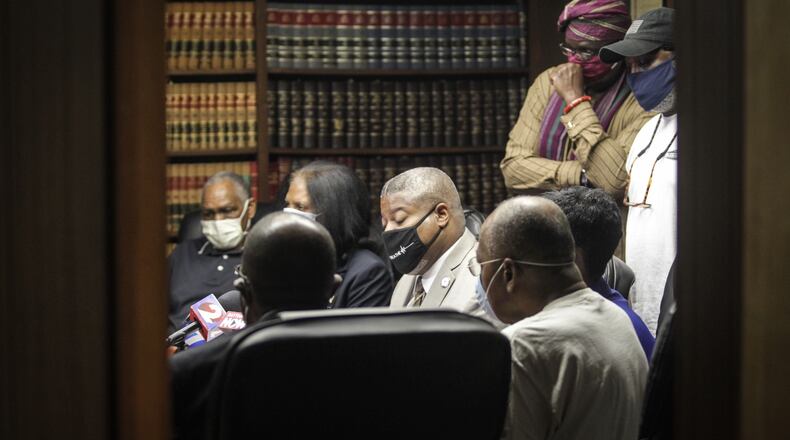The NAACP’s plan, which will be sent to all law enforcement agencies in Montgomery County, is needed because black people, particularly men, have been killed disproportionately by police around the country and the Dayton region, the Civil Rights Organization’s President Derrick Foward said during a news conference.
“This is not the first time that we’ve been in this space,” Foward said. “But we pray to the lord that this is the last time.”
RELATED: Dayton protests: Worried by violence; hopeful for change
A copy of the letter was to be sent to Dayton Police Chief Richard Biehl on Monday, Foward said, noting that copies will be sent to other county law enforcement agencies next week. Mayor Nan Whaley released a five-point plan last week that she said is intended to improve equity and combat systemic racism.
She said she welcomes the local NAACP unit's plan, and looks forward to working together with the group and other community organizations.
“We’re taking all this information from all different groups, which we’ve had numerous, and their feedback,” Whaley said. “So we hope that (the NAACP) will come to the table and work with us on this effort.”
The Montgomery County Sheriff’s office declined to comment on the plan until they receive a copy of the letter, a spokeswoman said.
Foward distributed copies of the letter to the media.
“Following the violent deaths of George Floyd, John Crawford III, Breonna Taylor, Ahmaud Arbery, Dontae Martin and so many other African Americans, and amid the resulting protests, citizens in our community want to know how the legal and judicial systems in concert with city officials and community leaders can do more,” according to the letter, which is co-signed by 21 other area organizations. “We request that your police department work toward developing a concrete plan on how to build and sustain safety, employment opportunities, and equity within and across communities. How do we help each other? How do we move forward?”
RELATED: Dayton protests: Worried by violence; hopeful for change
The eight steps are:
The plan, Foward said, will have a positive impact on the community, and Montgomery County will be a model for the nation. He’s calling on all county law enforcement agencies to “abide by each demand.”
EARLIER: Dayton area church leaders: Protesters’ voices not being heard
The city of Dayton’s plan calls for:
- Increased transparency when reporting suspected police misconduct and strengthening the Citizen Appeal Boards.
- Assess all recent incidences in which force was used by Dayton police to look for patterns and biases, which will inform a review of use of force policies.
- Continue implicit bias and deescalation training for Dayton officers.
- Review police recruitment and hiring processes to better identify potential issues in new officers and increase diversity.
- Deepen community engagement by rank and file officers to strengthen relationships.
The city’s plan doesn’t go far enough, although he’s looking forward to working with the city and other county agencies, Forward said. The organization plans to meet with the various county law enforcement agencies monthly, he said.
The NAACP and its partners also urged prosecutors to hold police officers accountable when they kill black people or commit other crimes.
“Police officers who choose to hide behind white privilege and choose to hide behind the blue suit, who choose to hide behind the badge, or their guns, who continuously murder African Americans, that may be subject to the same legal process that African Americans are subject to,” said The Rev. Rockney Carter, chair of the Clergy Community Coalition. “What that means is that they need to be charged. They need to be tried. They need to be convicted. They need to be sentenced, and they need to be incarcerated at the same rate as African Americans. It’s only equitable in our system.”
About the Author
